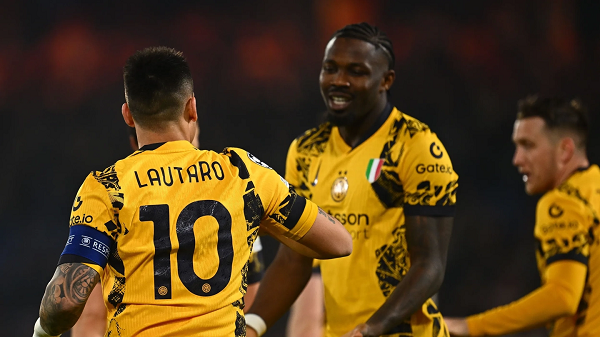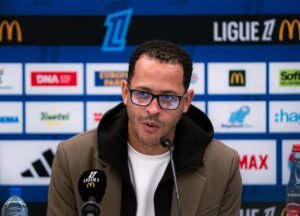PSG and Inter Milan – strengths and weaknesses, team tactics, and all the areas where the Champions League final could be won or lost
Two teams with opposite trajectories will intersect in the Champions League final in Munich, one side with an average age of 30 years and four months, the other 24 years and seven months; one side hailed for the best free‑flowing, attacking football in Europe, the other full of disciplined veterans, with a lot of composure, heart and drive.
Tactically, PSG favour build-up, quick positional movements and pace, while Inter rely on structure, solidity and counter‑attack.
Here are five key areas where the battle could be won or lost.
Midfield battle
The middle of the park is an area to watch out for. PSG may seize control of possession and tempo, but they will have to overpower an Inter midfield willing to work hard and tolerate pain.
Inter’s engine‑room has tireless box‑to‑box star Nicolo Barella, who is the man most eager to charge forward out of their midfield three. Orchestrators Hakan Calhanoglu and Henrikh Mkhitaryan are great both on and off the ball. They have coped with both Bayern and Barcelona across nearly 400 minutes of football.
Mkhitaryan, despite his age, showed proof of strength to get around even in the late stages of the game against the much younger Barcelona squad. He was ultimately replaced by Davide Frattesi, who has shown a knack for coming in guns blazing. He scored late winners against both Bayern and Barcelona, his 99th minute strike ultimately condemning the Catalans to a defeat at the San Siro.
PSG have a midfield three composed of Portuguese schemer Vitinha, Spaniard Fabian Ruiz, and Joao Neves. All three have flair and incredible ball-playing ability, but they come across veterans who have reached the final on the back of beating a similar midfield three of Pedri, Frenkie De Jong and Dani Olmo. Vitinha himself has acknowledged the task, calling Inter’s trio “great players in midfield” and the final “an interesting challenge”.
Who’s waiting in the wings?
Raw speed and overlapping runs on the wings can tear apart packed defences. Teams usually adopt this tactic to stretch out their opponents, who would naturally prefer to cluster in the middle. If there is serious movement down the wings, they’ll have to commit men to the flanks, forcing spaces that opponents can run into.
PSG’s attack thrives on two highly advanced full-backs in Achraf Hakimi and Nuno Mendes. The Moroccan has already chipped in with three goals and five assists in the Champions League this season, while Mendes has four goals and two assists.
The left side also features Khvicha Kvaratskhelia’s dribbling and energy, and on the right Desire Doue or Bradley Barcola. Enrique deploys Ousmane Dembele in the middle where he drops deep like a false nine, allowing both full backs and wingers to act as runners on either side, with the Frenchman finding them with slick passing. PSG have scored many goals this way.
Opposing them, Inter fields dynamic wing‑backs: Denzel Dumfries on the right and Federico Dimarco on the left. Dumfries in particular provides width and support in attack and his physicality and incredible crossing ability pose a constant threat to PSG’s back line. Against Barcelona, who are poor at set-pieces, Dumfries performed spectacularly, scoring two and assisting three of Inter’s goals across the two legs. PSG have a similar weakness and will have to keep an eye on the wings.
Fast breaks
PSG have the speed of Dembele, Doue and Barcola in attack, with Dembele often acting as a decoy as explained above. When Inter go forward to attack, they will have to be mindful of those dangerous fast breaks. A similar break led to PSG’s second goal against Aston Villa at the Parc des Princes, with fast transition leading to a one-on-one with Kvaratskhelia against Axel Disasi.
There is no question that Inter are one of the best defensive sides in Europe. While their 11 goals conceded puts them behind Arsenal (10) statistically, six out of those 11 goals came in the two legs against Barcelona. In their previous 12, Inzaghi’s side had conceded only five.
The Nerazzurri’s back three, marshalled by left‑footed centre‑back Alessandro Bastoni, who is lauded as one of Europe’s finest defenders, has proved remarkably solid. The extent to which they can keep a solid middle and cut off wide channels will be decisive. Inzaghi’s side will ideally want to keep the game closed and stuffy.
Inter have fast breaks of their own, with Lautaro Martinez and Marcus Thuram arguably two of the best strikers in Europe in terms of hold-up play. Inter’s creative outlets in the midfield, Hakan Calhanoglu and Mkhitaryan, will be aiming to get the ball up the field quickly to the two men.
Inzaghi’s wing-backs play a similar role, aiming to drive down the typically less congested flanks as a quick route to the forwards. Inter’s first goal against Barcelona came this way, with Dumfries crossing for Thuram to finish.
Forwards can prove decisive
Inter will rely on the clinical form of Lautaro Martinez, who has been prolific all season. Thuram is also extremely capable, scoring a cheeky flick in the second minute against Barcelona.
Both players are powerful runners whose chemistry and off‑the‑ball movement can exploit any defensive gap. They will be looking for space between PSG’s defensive lines with their experienced movement.
PSG will have Dembele, who has eight goals this campaign, alongside crafty supporting attackers like Kvaratskhelia, Barcola and Doue. A moment of brilliance from any of these players could decide the contest. With Aston Villa defending a 1-0 lead in the first half against PSG, Doue found a moment of inspiration to unleash a shot from outside the area that careened in off the post.
Both sides have excellent goalkeepers
Yann Sommer was Inter’s saviour in the semi-final against Barcelona, with reflexes that kept out wave after wave of the Catalans’ chances. He made at least five world‑class saves in that game, with the match becoming at some point almost a Shaolin Soccer-style face-off between him and Lamine Yamal.
Gianluigi Donnarumma has also been superb for PSG, pulling off acrobatic stops to deny Arsenal’s best in the second leg, notably Martin Odegaard and Bukayo Saka.
Both goalkeepers will no doubt save their side several times during the final. It could come down to a question of who is simply impregnable on the night. Finals are well known to be decided by small margins.
If matters were to turn to a penalty shoot-out, both sides can also count on their goalkeepers. Sommer was decisive for Switzerland in the Euro 2020 round-of-16, while Donnarumma has a remarkable 87.5% success rate in shoot-outs.




